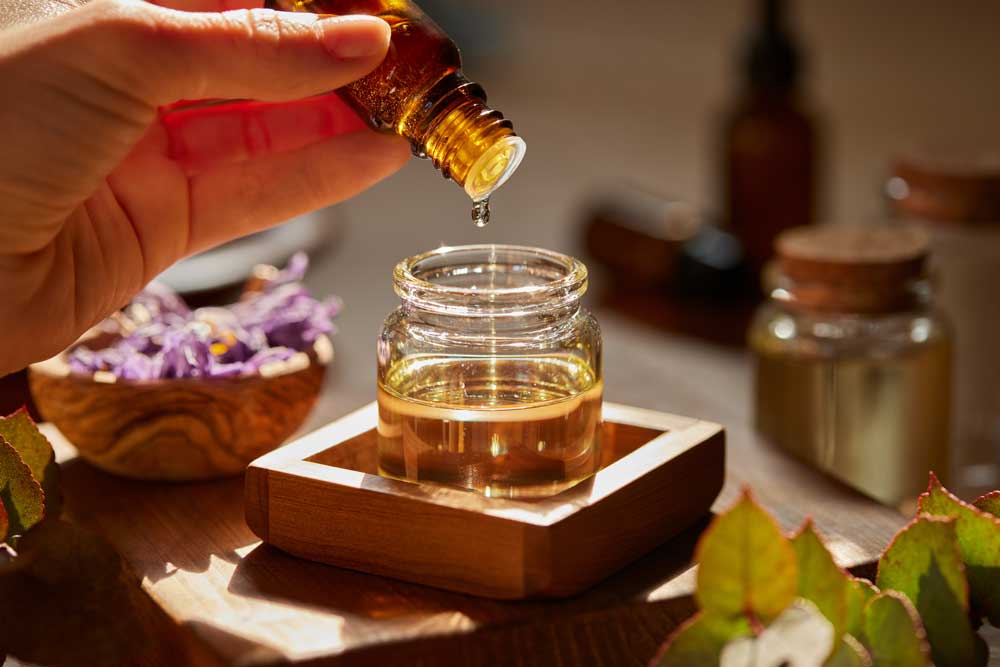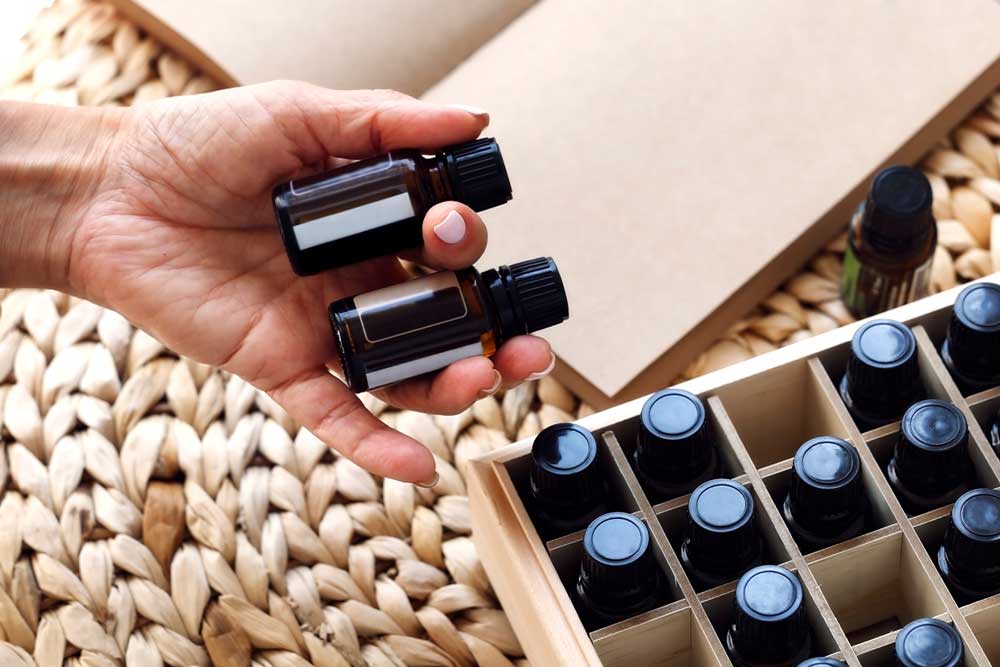Essential oils are concentrated plant extracts obtained from various parts of the plant, including flowers, leaves, stems, roots, and even fruits. These aromatic compounds capture the plant's natural fragrance and beneficial properties, making them an integral part of holistic health practices, aromatherapy, and skincare routines. Each essential oil possesses unique characteristics, derived from the specific plant it originates from, allowing them to deliver a wide array of benefits.
The process of extracting essential oils typically involves techniques such as steam distillation, cold pressing, or solvent extraction. Steam distillation is the most common method, where steam is passed through plant material, causing the essential oil to evaporate. This vapor is then cooled and condensed back into liquid form, separating the oil from the water. The resulting essential oil is a concentrated essence that embodies the plant's distinctive aroma and therapeutic qualities.
What sets essential oils apart from other types of oils is their volatile nature; they readily evaporate and disperse into the air. This characteristic not only contributes to their captivating scents but also plays a vital role in their applications. When inhaled, essential oils can stimulate the olfactory system and interact with the limbic system in the brain, which is responsible for emotions, memories, and behaviour. This connection is why many people turn to essential oils for emotional support and relaxation.
Historically, essential oils have been utilised in various cultures for their healing properties. Ancient Egyptians used oils in the embalming process and for medicinal purposes, while traditional Chinese and Indian medicine integrated essential oils into their healing practices for thousands of years. Today, essential oils have gained significant popularity in the wellness community, with individuals seeking natural alternatives for stress relief, skincare, and overall well-being.
Benefits of Essential Oils
The benefits of essential oils are numerous and varied, making them a sought-after option for many looking to improve their health and wellness. Here are some notable advantages:
1. Stress Relief: Many essential oils, such as lavender and chamomile, are known for their calming effects, helping to reduce stress and anxiety.
2. Improved Sleep: Oils like cedarwood and bergamot can promote restful sleep by calming the mind and body.
3. Pain Relief: Certain essential oils, such as peppermint and eucalyptus, have analgesic properties that can help alleviate headaches, muscle aches, and joint pain.
4. Enhanced Mood: Citrus oils like lemon and orange can uplift your mood and increase feelings of positivity and happiness.
5. Anti-inflammatory Properties: Oils like tea tree and frankincense are renowned for their anti-inflammatory benefits, making them excellent for skincare and overall health.
6. Antimicrobial Effects: Some essential oils have natural antimicrobial properties, which can help combat infections and support the immune system.
7. Improved Focus and Concentration: Oils like rosemary and peppermint are believed to enhance cognitive function and improve focus.
8. Skin Care: Essential oils can be beneficial for various skin conditions. For example, tea tree oil is often used for acne, while lavender oil is known for its soothing effects.
9. Digestive Support: Oils such as ginger and peppermint can aid digestion and reduce nausea.
10. Air Freshening: Many essential oils, such as eucalyptus and lemon, serve as natural air fresheners and purifiers, creating a pleasant and invigorating environment.
These benefits highlight the versatility of essential oils, making them an integral part of many holistic wellness routines.

How Do Essential Oils Work?
Understanding how essential oils work requires delving into their chemical composition. Essential oils are made up of various chemical compounds that can interact with the body in different ways. When inhaled, these oils can stimulate the olfactory system, sending signals to the brain that can influence emotions and stress levels. Additionally, when applied topically, they can be absorbed through the skin, interacting with the body's own biochemistry to promote healing and balance. This multi-faceted approach is what makes essential oils such powerful allies in supporting health and wellness.
Types of Essential Oils
There are hundreds of essential oils available, each with unique properties and uses. Here are some of the most popular types:
1. Lavender Oil: Known for its calming properties, lavender oil is often used for relaxation and sleep.
2. Peppermint Oil: This oil is popular for its invigorating scent and is commonly used for headaches and digestive issues.
3. Tea Tree Oil: Renowned for its antibacterial and antifungal properties, tea tree oil is a staple in skincare routines.
4. Eucalyptus Oil: Often used in respiratory therapies, eucalyptus oil helps clear airways and alleviate cold symptoms.
5. Lemon Oil: This uplifting oil is great for improving mood and enhancing focus, while also serving as a natural disinfectant.
6. Frankincense Oil: Known for its anti-inflammatory properties, frankincense is often used in meditation and skincare.
7. Bergamot Oil: With its refreshing scent, bergamot is used for stress relief and improving mood.
8. Rosemary Oil: Popular for boosting memory and concentration, rosemary oil is often included in aromatherapy blends.
9. Chamomile Oil: This oil is well-known for its soothing properties, often used to promote sleep and relaxation.
10. Geranium Oil: Often used in skincare, geranium oil helps balance oil production and promotes a healthy complexion.
These essential oils can be used individually or blended together to enhance their benefits.
How to Choose the Right Essential Oil
Choosing the right essential oil can significantly enhance your experience and results. Here are some tips on how to choose the best essential oil for your needs:
1. Identify Your Needs: Consider what you want to achieve—whether it's relaxation, pain relief, or skincare.
2. Research Properties: Look into the specific properties of different oils to find those that align with your needs.
3. Consider Quality: Choose high-quality oils that are 100% pure and free from synthetic additives. Look for reputable brands that provide third-party testing results.
4. Fragrance Preference: Since essential oils have distinct scents, choose one that you enjoy and feel comfortable using.
5. Allergies and Sensitivities: Be mindful of any allergies or sensitivities you may have, as some oils can cause reactions in certain individuals.
6. Consult a Professional: If you’re unsure, consult a certified aromatherapist or healthcare provider for personalised recommendations.
By taking these factors into account, you can find the essential oils that best suit your lifestyle and wellness goals.
Potential Side Effects of Essential Oils
While essential oils offer numerous benefits, they can also cause side effects if not used correctly. Here are some potential side effects to be aware of:
1. Skin Irritation: Some essential oils can cause irritation or allergic reactions when applied directly to the skin without dilution. Always perform a patch test before using a new oil.
2. Respiratory Issues: Inhaling certain essential oils in excessive amounts may lead to respiratory issues, particularly in individuals with asthma or other respiratory conditions.
3. Hormonal Effects: Some oils, like tea tree and lavender, may have hormonal effects and should be used with caution, especially in children.
4. Photosensitivity: Citrus oils, such as lemon and bergamot, can cause photosensitivity, increasing the risk of sunburn when applied to the skin and exposed to sunlight.
5. Interactions with Medications: Essential oils can interact with certain medications, so consult your healthcare provider before use if you are on medication.
To mitigate these risks, it’s essential to use essential oils responsibly and seek guidance from professionals when necessary.

Conclusion
In summary, essential oils offer a wealth of benefits for physical and emotional well-being. From stress relief to improved skin health, they provide natural solutions for a variety of health concerns. Understanding what essential oils are and how to use them effectively can enhance your daily routine and overall quality of life. By exploring the different types of oils, their benefits, and safe usage practices, you can unlock the full potential of these aromatic wonders.
In addition to their individual benefits, essential oils can also be combined in synergistic blends to enhance their effects. This not only allows for a more personalised approach to wellness but also encourages creativity in how we incorporate them into our lives. Whether you choose to diffuse your favourite oils during meditation, add them to your bath for a relaxing soak, or create custom skincare formulations, the possibilities are endless. By embracing the power of essential oils, you can create a holistic lifestyle that promotes balance, relaxation, and vitality, transforming your home into a sanctuary of well-being and serenity. So, take the time to explore, experiment, and discover how these fragrant treasures can enrich your life and enhance your overall health journey.
FAQs
What are essential oils?
Essential oils are concentrated extracts from plants that capture their natural fragrance and beneficial properties.
How do you use essential oils?
Essential oils can be used in various ways, including inhalation, topical application (with dilution), and in diffusers.
What are the benefits of essential oils?
They offer numerous benefits, including stress relief, improved mood, pain relief, and enhanced skin health.
How do I use essential oils safely?
Always dilute essential oils with a carrier oil before applying to the skin, and perform a patch test to check for any allergic reactions.
Can essential oils interact with medications?
Yes, some essential oils can interact with medications, so it’s important to consult your healthcare provider if you’re on any medications.